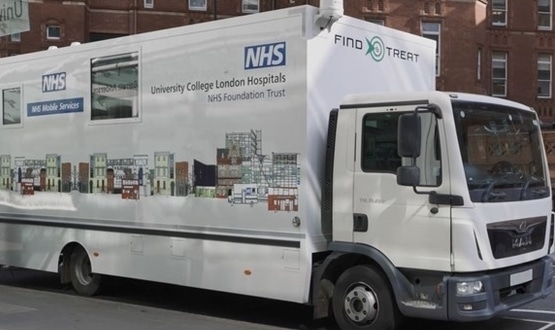‘Find and Treat’ mobile van helping to tackle infectious diseases in London
- 28 March 2022

A mobile health clinic which is fitted with a range of digital tools and software is being used to tackle infectious diseases in London.
The ‘Find and Treat’ van is part of NHS Digital’s Future Wireless Project Trials and has been deployed from University College London Hospitals (UCLH). It was recently fitted with an array of high-tech tools and software to enable real-time remote diagnosis and referrals on board the mobile health unit.
The new technology includes a digital portable X-ray camera, artificial intelligence software, a tele-radiology network to allow remote reading of X-rays using the trials flat-pack satellites, 4G and 5G routers, roaming SIM cards and smart antenna systems.
The service aims to tackle a wide range of infectious and chronic diseases such as tuberculosis, Covid-19, Hepatitis B and C, HIV, cardiovascular issues, STIs and Flu.
In a typical year, Find and Treat screens around 10,000 vulnerable people in the capital, including those with tuberculosis (TB). More than 4,000 people are diagnosed with TB in England each year, showing how important the mobile treatment service is.
The disease is not just a problem in England, but all over the world. Last December, Feedback expanded its cloud-based TB programme in rural India, after receiving funding from Amazon Web Services.
Patrick Clark, director of infrastructure services at NHS Digital, said: “We want technology to be used to help make healthcare accessible for everyone and reliable, high-speed connectivity is vital to enabling that.
“The multiple wireless connectivity options on board UCLH’s high-tech Find and Treat mobile unit are enabling sophisticated digital solutions to be used to help vulnerable patients get diagnoses quickly and easily without needing to visit a hospital.
“We’ll be monitoring the impact of the Find and Treat scheme in London and considering how such initiatives might be successfully adopted elsewhere to reach those least able to access healthcare.”
Find and Treat’s team of peer workers have lived experience of homelessness and help build trust and understanding with a patient group suffering from diseases of poverty and inequality. The team also provided Covid-19 testing and vaccinations to the homeless during the pandemic.
Ousainou Sarr, a Find and Treat outreach worker, was diagnosed with TB by the service in 2011, after losing his job and living on the street. He now uses his past experience of homelessness and diagnosis through Find and Treat to encourage vulnerable people to access the service.
Sarr said: “People sleeping rough are very vulnerable to TB. I encourage them to be screened on board the van and explain the benefits to them – the service can screen people with X-rays, provide diagnoses on the spot and, most importantly, follow up with people to make sure they get the treatment they need.
“I can’t thank Find and Treat enough for the service it provides to people who are homeless. If it wasn’t for Find and Treat, I wouldn’t be here today.”
NHS Digital’s great work to tackle diseases in the last few years is not just evident in the Find and Treat service. Recently, they made new data available to researchers in a secure environment to help them understand the impact of Covid-19 on those living with cancer.




